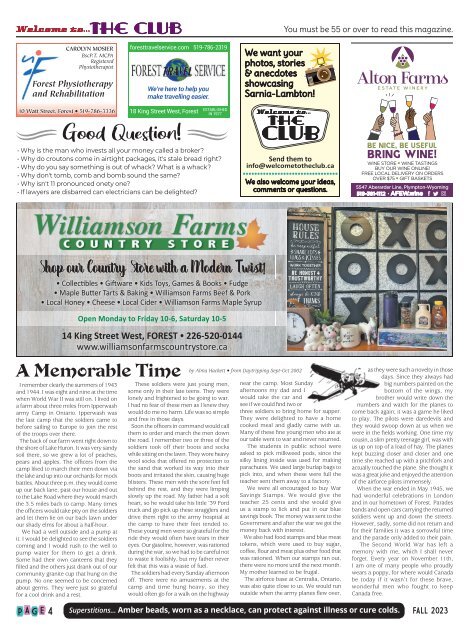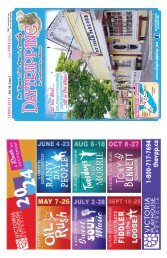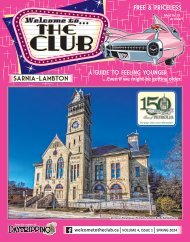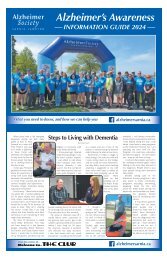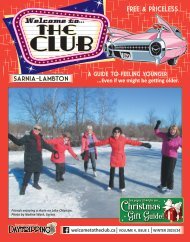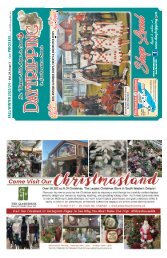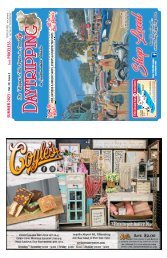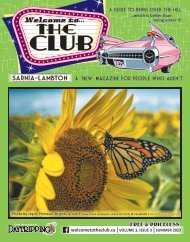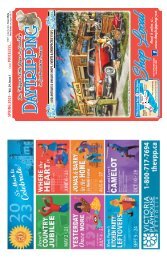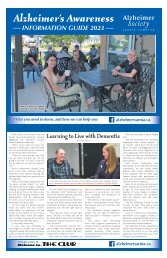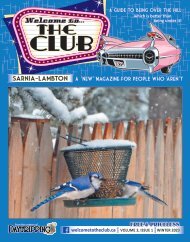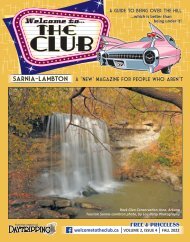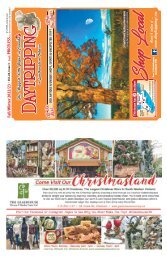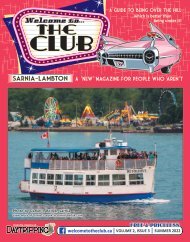Welcome to The Club v3.4 Fall 2023
A Magazine for 55+ Like No Other! Welcome to The Club features timeless articles and anecdotes including many from the archives of Daytripping Magazine. It's online at www.welcometotheclub.ca and is also distributed free in Sarnia-Lambton, Ontario.
A Magazine for 55+ Like No Other!
Welcome to The Club features timeless articles and anecdotes including many from the archives of Daytripping Magazine. It's online at www.welcometotheclub.ca and is also distributed free in Sarnia-Lambton, Ontario.
Create successful ePaper yourself
Turn your PDF publications into a flip-book with our unique Google optimized e-Paper software.
<strong>Welcome</strong> <strong>to</strong> ...<br />
THE <strong>Club</strong><br />
You must be 55 or over <strong>to</strong> read this magazine.<br />
<strong>Welcome</strong> <strong>to</strong> ...<br />
FALL <strong>2023</strong><br />
CAROLYN R L N MOSIER<br />
BscP.T. MCPA<br />
Registered<br />
ered<br />
ed<br />
Physiotherapist<br />
ist<br />
Forest Physiotherapy<br />
and Rehabilitation<br />
10 Watt Street, et<br />
Forest • 519-786-3336<br />
36<br />
foresttravelservice.com 519-786-2319<br />
We’re here <strong>to</strong> help you<br />
make travelling easier.<br />
18 King Street West, Forest<br />
ESTABLISHED<br />
Good Question!<br />
IN 1977<br />
• Why is the man who invests all your money called a broker?<br />
• Why do crou<strong>to</strong>ns come in airtight packages, it's stale bread right?<br />
• Why do you say something is out of whack? What is a whack?<br />
• Why don't <strong>to</strong>mb, comb and bomb sound the same?<br />
• Why isn't 11 pronounced onety one?<br />
• If lawyers are disbarred can electricians can be delighted?<br />
We want your<br />
pho<strong>to</strong>s, s<strong>to</strong>ries<br />
& anecdotes<br />
showcasing<br />
Sarnia-Lamb<strong>to</strong>n!<br />
<strong>Welcome</strong> <strong>to</strong> ...<br />
THE<br />
CLUB<br />
Send them <strong>to</strong><br />
info@welcome<strong>to</strong>theclub.ca<br />
We also welcome your ideas,<br />
comments or questions.<br />
WINE STORE WINE TASTINGS<br />
BUY OUR WINE ONLINE!<br />
FREE LOCAL DELIVERY ON ORDERS<br />
OVER $75 GIFT BASKETS<br />
5547 Aberarder Line, Plymp<strong>to</strong>n-Wyoming<br />
519-381-1112 • AFEW.wine<br />
• Collecbles • Giware • Kids Toys, Games & Books • Fudge<br />
• Maple Buer Tarts & Baking • Williamson Farms Beef & Pork<br />
• Local Honey • Cheese • Local Cider • Williamson Farms Maple Syrup<br />
Open Monday <strong>to</strong> Friday 10-6, Saturday 10-5<br />
14 King Street West, FOREST • 226-520-0144<br />
www.williamsonfarmscountrys<strong>to</strong>re.ca<br />
A Memorable Time<br />
I remember clearly the summers of 1943<br />
and 1944. I was eight and nine at the time<br />
when World War II was still on. I lived on<br />
a farm about three miles from Ipperwash<br />
army Camp in Ontario. Ipperwash was<br />
the last camp that the soldiers came <strong>to</strong><br />
before sailing <strong>to</strong> Europe <strong>to</strong> join the rest<br />
of the troops over there.<br />
<strong>The</strong> back of our farm went right down <strong>to</strong><br />
the shore of Lake Huron. It was very sandy<br />
soil there, so we grew a lot of peaches,<br />
pears and apples. <strong>The</strong> officers from the<br />
camp liked <strong>to</strong> march their men down via<br />
the lake and up in<strong>to</strong> our orchards for mock<br />
battles. About three p.m. they would come<br />
up our back lane, past our house and out<br />
<strong>to</strong> the Lake Road where they would march<br />
the 3.5 miles back <strong>to</strong> camp. Many times<br />
the officers would take pity on the soldiers<br />
and let them lie on our back lawn under<br />
our shady elms for about a half-hour.<br />
We had a well outside and a pump at<br />
it. I would be delighted <strong>to</strong> see the soldiers<br />
coming and I would rush <strong>to</strong> the well <strong>to</strong><br />
pump water for them <strong>to</strong> get a drink.<br />
Some had their own canteens that they<br />
filled and the others just drank out of our<br />
community granite cup that hung on the<br />
pump. No one seemed <strong>to</strong> be concerned<br />
about germs. <strong>The</strong>y were just so grateful<br />
for a cool drink and a rest.<br />
<strong>The</strong>se soldiers were just young men,<br />
some only in their late teens. <strong>The</strong>y were<br />
lonely and frightened <strong>to</strong> be going <strong>to</strong> war.<br />
I had no fear of these men as I knew they<br />
would do me no harm. Life was so simple<br />
and free in those days.<br />
Soon the officers in command would call<br />
them <strong>to</strong> order and march the men down<br />
the road. I remember two or three of the<br />
soldiers <strong>to</strong>ok off their boots and socks<br />
while sitting on the lawn. <strong>The</strong>y wore heavy<br />
wool socks that offered no protection <strong>to</strong><br />
the sand that worked its way in<strong>to</strong> their<br />
boots and irritated the skin, causing huge<br />
blisters. <strong>The</strong>se men with the sore feet fell<br />
behind the rest, and they were limping<br />
slowly up the road. My father had a soft<br />
heart, so he would take his little ’39 Ford<br />
truck and go pick up these stragglers and<br />
drive them right <strong>to</strong> the army hospital at<br />
the camp <strong>to</strong> have their feet tended <strong>to</strong>.<br />
<strong>The</strong>se young men were so grateful for the<br />
ride they would often have tears in their<br />
eyes. Our gasoline, however, was rationed<br />
during the war, so we had <strong>to</strong> be careful not<br />
<strong>to</strong> waste it foolishly, but my father never<br />
felt that this was a waste of fuel.<br />
<strong>The</strong> soldiers had every Sunday afternoon<br />
off. <strong>The</strong>re were no amusements at the<br />
camp and time hung heavy, so they<br />
would often go for a walk on the highway<br />
by Alma Hackett • from Daytripping Sept-Oct 2002<br />
as<br />
near the camp. Most Sunday<br />
afternoons my dad and I<br />
would take the car and<br />
see if we could find two or<br />
three soldiers <strong>to</strong> bring home for supper.<br />
<strong>The</strong>y were delighted <strong>to</strong> have a home<br />
cooked meal and gladly came with us.<br />
Many of these fine young men who ate at<br />
our table went <strong>to</strong> war and never returned.<br />
<strong>The</strong> students in public school were<br />
asked <strong>to</strong> pick milkweed pods, since the<br />
silky lining inside was used for making<br />
parachutes. We used large burlap bags <strong>to</strong><br />
pick in<strong>to</strong>, and when these were full the<br />
teacher sent them away <strong>to</strong> a fac<strong>to</strong>ry.<br />
We were all encouraged <strong>to</strong> buy War<br />
Savings Stamps. We would give the<br />
teacher 25 cents and she would give<br />
us a stamp <strong>to</strong> lick and put in our blue<br />
savings book. <strong>The</strong> money was sent <strong>to</strong> the<br />
Government and after the war we got the<br />
money back with interest.<br />
We also had food stamps and blue meat<br />
<strong>to</strong>kens, which were used <strong>to</strong> buy sugar,<br />
coffee, flour and meat plus other food that<br />
was rationed. When our stamps ran out,<br />
there were no more until the next month.<br />
My mother learned <strong>to</strong> be frugal.<br />
<strong>The</strong> airforce base at Centralia, Ontario,<br />
was also quite close <strong>to</strong> us. We would run<br />
outside when the army planes flew over,<br />
they were such a novelty in those<br />
days. Since they always had<br />
big numbers painted on the<br />
bot<strong>to</strong>m of the wings, my<br />
brother would write down the<br />
numbers and watch for the planes <strong>to</strong><br />
come back again; it was a game he liked<br />
<strong>to</strong> play. <strong>The</strong> pilots were daredevils and<br />
they would swoop down at us when we<br />
were in the fields working. One time my<br />
cousin, a slim pretty teenage girl, was with<br />
us up on <strong>to</strong>p of a load of hay. <strong>The</strong> planes<br />
kept buzzing closer and closer and one<br />
time she reached up with a pitchfork and<br />
actually <strong>to</strong>uched the plane. She thought it<br />
was a great joke and enjoyed the attention<br />
of the airforce pilots immensely.<br />
When the war ended in May 1945, we<br />
had wonderful celebrations in London<br />
and in our home<strong>to</strong>wn of Forest. Parades<br />
bands and open cars carrying the returned<br />
soldiers went up and down the streets.<br />
However, sadly, some did not return and<br />
for their families it was a sorrowful time<br />
and the parade only added <strong>to</strong> their pain.<br />
<strong>The</strong> Second World War has left a<br />
memory with me, which I shall never<br />
forget. Every year on November 11th,<br />
I am one of many people who proudly<br />
wears a poppy, for where would Canada<br />
be <strong>to</strong>day if it wasn’t for these brave,<br />
wonderful men who fought <strong>to</strong> keep<br />
Canada free.<br />
P A G E<br />
4<br />
Superstitions... Amber beads, worn as a necklace, can protect against illness or cure colds.


